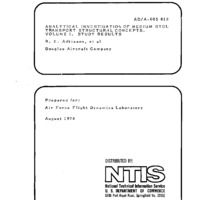-
Title
-
Analytical Investigation of Medium STOL Transport Structural Concepts: Volume I. Study Results
-
Description
-
Results of a study program to devise and evaluate new structural concepts of lower weight and cost for a medium STOL transport aircraft are presented. The wing box, fuselage shell and empennage stabilizer structure of the projected C-15 production airplane were designated as the study (and baseline) components. Selected concepts are evaluated for structural integrity, weight, manufacturing methods, applicability of NDI methods, production and life cycle costs and aircraft performance payoffs. Structural integrity analyses of both the baseline and new concepts are based on a common set of requirements for ultimate strength, fatigue life, damage tolerance and flutter rigidity.
The primary materials considered are aluminum. titanium. steel and beryllium. Of these, aluminum 7050 and 7475 are a best choice for minimum production cost and low weight. The primary geometry concepts considered include integral stiffened, honeycomb and isogrid (a special form of integral stiffened). Integral stiffened and honeycomb geometry, in conjunction with the selected aluminum materials, produce weight and cost savings in the participating individual components of up to 10% which are further reflected as overall life cycle cost savings and performance payoffs at the aircraft system level. Innovative concepts for wing cover panel spanwise skin splices are also shown.
Requirements for simple "design-for-weight" and "design-for-cost" methods are identified. A simple "design-for-weight" method integrating materials, geometries and requirements was conceived and is implemented. A simple concept selection parameter based on unit weight and cost is also identified. Methods for developing consistent material property data and correlating of notched specimen fatigue data are also presented •
-
Index Abstract
-
Not Available
-
Photo Quality
-
Not Needed
-
Report Number
-
AFFDL TR 74-109 Volume I
-
Index Price
-
$0.00
-
Report Availability
-
Full text available
-
Creator
-
Adkisson, R. E.
-
et al
-
Deneff, G. V.
-
Date
-
1974
-
Date Issued
-
1974-08
-
Extent
-
423
-
Corporate Author
-
Douglas Aircraft Company, McDonnell Douglas Corporation
-
Laboratory
-
Air Force Flight Dynamics Laboratory
-
Identifier
-
ADA005818
-
ADA005818
-
Corporate Report Number
-
MDC J-6625, Volume I
-
Contract
-
F33615-73-C-3049
-
DoD Project
-
1368
-
DoD Task
-
0212
-
Distribution Conflict
-
No
-
Access Rights
-
Approved for public release; distribution unlimited.
-
Distribution Classification
-
1
-
DTIC Record Exists
-
Yes
-
Abstract
-
Results of a study program to devise and evaluate new structural concepts of lower weight and cost for a medium STOL transport aircraft are presented. The wing box, fuselage shell and empennage stabilizer structure of the projected C-15 production airplane were designated as the study (and baseline) components. Selected concepts are evaluated for structural integrity, weight, manufacturing methods, applicability of NDI methods, production and life cycle costs and aircraft performance payoffs. Structural integrity analyses of both the baseline and new concepts are based on a common set of requirements for ultimate strength, fatigue life, damage tolerance and flutter rigidity.
The primary materials considered are aluminum. titanium. steel and beryllium. Of these, aluminum 7050 and 7475 are a best choice for minimum production cost and low weight. The primary geometry concepts considered include integral stiffened, honeycomb and isogrid (a special form of integral stiffened). Integral stiffened and honeycomb geometry, in conjunction with the selected aluminum materials, produce weight and cost savings in the participating individual components of up to 10% which are further reflected as overall life cycle cost savings and performance payoffs at the aircraft system level. Innovative concepts for wing cover panel spanwise skin splices are also shown.
Requirements for simple "design-for-weight" and "design-for-cost" methods are identified. A simple "design-for-weight" method integrating materials, geometries and requirements was conceived and is implemented. A simple concept selection parameter based on unit weight and cost is also identified. Methods for developing consistent material property data and correlating of notched specimen fatigue data are also presented •
-
Publisher
-
Wright-Patterson Air Force Base, OH : Air Force Flight Dynamics Laboratory, Air Force Systems Command
-
Date Modified
-
Scanned by request 1/21/2020 submitted by private citizen (Private Citizen)
-
AD Number
-
AD/A-005818
-
Provenance
-
Bombardier/Aero
-
Type
-
report
-
Format
-
1 online resource (xxx, 423 pages) : ill.
-
Subject
-
Transport Aircraft
-
Short Takeoff Aircraft
-
Manufacturing
-
Nondestructive Testing
-
Experimental Design
-
Geometric Forms
-
Airframes
-
Structural Components
-
Structural Engineering
